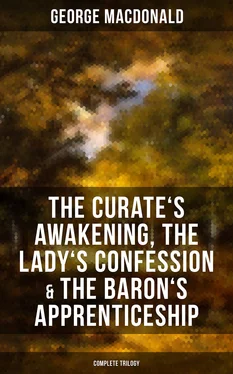The curate presented himself at the dinner-hour in Mrs. Ramshorn's drawing-room, looking like any other gentleman, satisfied with his share in the administration of things, and affecting nothing of the professional either in dress, manner, or tone. Helen saw him for the first time in private life, and, as she had expected, saw nothing remarkable—a man who looked about thirty, was a little over the middle height, and well enough constructed as men go, had a good forehead, a questionable nose, clear grey eyes, long, mobile, sensitive mouth, large chin, pale complexion, and straight black hair, and might have been a lawyer just as well as a clergyman. A keener, that is, a more interested eye than hers, might have discovered traces of suffering in the forms of the wrinkles which, as he talked, would now and then flit like ripples over his forehead; but Helen's eyes seldom did more than slip over the faces presented to her; and had it been otherwise, who could be expected to pay much regard to Thomas Wingfold when George Bascombe was present? There, indeed, stood a man by the corner of the mantelpiece!—tall and handsome as an Apollo, and strong as the young Hercules, dressed in the top of the plainest fashion, self-satisfied, but not offensively so, good-natured, ready to smile, as clean in conscience, apparently, and as large in sympathy, as his shirt-front. Everybody who knew him, counted George Bascombe a genuine good fellow, and George himself knew little to the contrary, while Helen knew nothing.
One who had only chanced to get a glimpse of her in her own room, as in imagination my reader has done, would hardly have recognised her again in the drawing-room. For in her own room she was but as she appeared to herself in her mirror—dull, inanimate; but in the drawing-room her reflection from living eyes and presences served to stir up what waking life was in her. When she spoke, her face dawned with a clear, although not warm light; and although it must be owned that when it was at rest, the same over-stillness, amounting almost to dulness, the same seeming immobility, ruled as before, yet, even when she was not speaking, the rest was often broken by a smile—a genuine one, for although there was much that was stiff, there was nothing artificial about Helen. Neither was there much of the artificial about her cousin; for his good-nature, and his smile, and whatever else appeared upon him, were all genuine enough—the only thing in this respect not quite satisfactory to the morally fastidious man being his tone in speaking. Whether he had caught it at the university, or amongst his father's clerical friends, or in the professional society he now frequented, I cannot tell, but it had been manufactured somewhere—after a large, scrolly kind of pattern, sounding well-bred and dignified. I wonder how many speak with the voices that really belong to them.
Plainly, to judge from the one Bascombe used, he was accustomed to lay down the law, but in gentlemanly fashion, and not as if he cared a bit about the thing in question himself. By the side of his easy carriage, his broad chest, and towering Greek-shaped head, Thomas Wingfold dwindled almost to vanishing—in a word, looked nobody. And besides his inferiority in size and self-presentment, he had a slight hesitation of manner, which seemed to anticipate, if not to court, the subordinate position which most men, and most women too, were ready to assign him. He said, "Don't you think?" far oftener than "I think" and was always more ready to fix his attention upon the strong points of an opponent's argument than to re-assert his own in slightly altered phrase like most men, or even in fresh forms like a few; hence—self-assertion, either modestly worn like a shirt of fine chain-armour, or gaunt and obtrusive like plates of steel, being the strength of the ordinary man—what could the curate appear but defenceless, therefore weak, and therefore contemptible? The truth is, he had less self-conceit than a mortal's usual share, and was not yet possessed of any opinions interesting enough to himself to seem worth defending with any approach to vivacity.
Bascombe and he bowed in response to their introduction with proper indifference, after a moment's solemn pause exchanged a sentence or two which resembled an exercise in the proper use of a foreign language, and then gave what attention Englishmen are capable of before dinner to the two ladies—the elder of whom, I may just mention, was dressed in black velvet with heavy Venetian lace, and the younger in black silk, with old Honiton. Neither of them did much towards enlivening the conversation. Mrs. Ramshorn, whose dinner had as yet gained in interest with her years, sat peevishly longing for its arrival, but cast every now and then a look of mild satisfaction upon her nephew, which, however, while it made her eyes sweeter, did not much alter the expression of her mouth. Helen improved, as she fancied, the arrangement of a few green-house flowers in an ugly vase on the table.
At length the butler appeared, the curate took Mrs. Ramshorn, and the cousins followed—making, in the judgment of the butler as he stood in the hall, and the housekeeper as she peeped from the baise-covered door that led to the still-room, as handsome a couple as mortal eyes need wish to see. They looked nearly of an age, the lady the more stately, the gentleman the more graceful, or, perhaps rather, ELEGANT, of the two.
Table of Contents
During dinner, Bascombe had the talk mostly to himself, and rattled well, occasionally rebuked by his aunt for some remark which might to a clergyman appear objectionable; nor as a partisan was she altogether satisfied with the curate that he did not seem inclined to take clerical exception. He ate his dinner, quietly responding to Bascombe's sallies—which had usually more of vivacity than keenness, more of good spirits than wit—with a curious flickering smile, or a single word of agreement. It might have seemed that he was humouring a younger man, but the truth was, the curate had not yet seen cause for opposing him.
How any friend could have come to send Helen poetry I cannot imagine, but that very morning she had received by post a small volume of verse, which, although just out, and by an unknown author, had already been talked of in what are called literary circles. Wingfold had read some extracts from the book that same morning, and was therefore not quite unprepared when Helen asked him if he had seen it. He suggested that the poems, if the few lines he had seen made a fair sample, were rather of the wailful order.
"If there is one thing I despise more than another," said Bascombe, "it is to hear a man, a fellow with legs and arms, pour out his griefs into the bosom of that most discreet of confidantes, Society, bewailing his hard fate, and calling upon youths and maidens to fill their watering-pots with tears, and with him water the sorrowful pansies and undying rue of the race. I believe I am quoting."
"I think you must be, George," said Helen. "I never knew you venture so near the edge of poetry before."
"Ah, that is all you know of me, Miss Lingard!" returned Bascombe. "—And then," he resumed, turning again to Wingfold, "what is it they complain of? That some girls preferred a better man perhaps, or that a penny paper once told the truth of their poetry."
"Or it may be only that it is their humour to be sad," said Wingfold. "But don't you think," he continued, "it is hardly worth while to be indignant with them? Their verses are a relief to them, and do nobody any harm."
"They do all the boys and girls harm that read them, and themselves who write them more harm than anybody, confirming them in tearful habits, and teaching eyes unused to weep. I quote again, I believe, but from whom I am innocent. If I ever had a grief, I should have along with it the decency to keep it to myself."
Читать дальше












